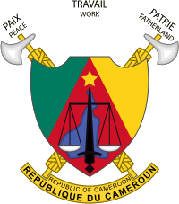The two days workshop on the operationalisation of the craftsperson’s professional card: functionalities and procedures for obtaining the card was launched on Wednesday August 03rd 2022 by Minister Achille BASSILEKIN III at the esplanade of the Yaoundé International Handicrafts Center. The goal of the workshop is to bring together all stakeholders involved in the process of formalizing craftspeople and handicraft enterprises in order to define the functionalities of the craftsperson’s professional card, as well as the modalities for obtaining it. This workshop is also geared towards the formalisation and migration of craftspeople from the informal sector to the formal sector thus, providing specific rights to each craftsperson who is regularly registered in a municipal register.
Speaking on behalf of the Director for the Handicraft and Informal Sector Migrations, the Head of the Capacity Reinforcement and Normalisation Follow-up Unit Mrs. Ntou’ou Agnes stressed on the objectives and expectation of the workshop as well as the statistics of the cards already delivered to craftpersons. As concerns the importance of the workshop, Mrs. Ntou’ou Agnes declared that this workshop serves as a forum to unite all actors concerned in the card registration and delivery stages so as to clarify the role each stakeholder has to play. As concerns statistic of already registered craftspersons, she mentioned that as of 2017 to 2020, MINPMEESA has collected and identified ten thousand eight hundred and twenty-eight (10,828) craftspeople via identification sheets which facilitated the production of five thousand seven hundred and seventy-nine (5779) professional cards.
Minister Achille BASSILEKIN III on his part buttressed the importance of the card by stating that the card is not just an identification tool but one which will boost the structural economic transformation as well as Cameroon’s entrepreneurial ecosystem. In this light, the MINPMEESA boss stressed the need for all stakeholders to put in their maximum effort to facilitate the migration of handicraft organization from the informal to the formal sector through their registration and possession of these professional cards. He further stated that the transfer of competences to local collectivities such as the Craftspeople Council Office through divisional delegations gives room for these structures to carter for the needs of craft persons as well as facilitate communal follow-up of craft persons and organizations.
It of key importance to note that this workshop will serve as a forum for stakeholders to identify what can be included in the card as a functionality; to define the conditions for obtaining the said card and to clarify the role of each stakeholder in using the card. Moreover, the workshop also entails developing a draft document which describes the different social, financial, training and health benefits as well as the implementing procedures and inclusion modalities of these functionalities in the card. Worth noting is the fact that the craftsperson’s professional card is not only an identification tool but will also serve the purposes of distinction and categorisation of craftspeople according his/her field of competence especially at the municipal level.

